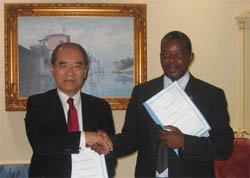 Official Visit of the Director-General to Equatorial Guinea (27-28 January 2006)At the invitation of the President of the Republic, Mr Teodoro Obiang Nguema Mbasogo, the Director-General of UNESCO, Mr Koïchiro Matsuura, paid his first official visit to Equatorial Guinea on 27 and 28 January 2006.
Official Visit of the Director-General to Equatorial Guinea (27-28 January 2006)At the invitation of the President of the Republic, Mr Teodoro Obiang Nguema Mbasogo, the Director-General of UNESCO, Mr Koïchiro Matsuura, paid his first official visit to Equatorial Guinea on 27 and 28 January 2006.During the audience and the dinner hosted afterwards by the Head of State, in his residence of Bata and in the presence of the Prime Minister and the Minister of Education, Sciences and Sports, the state of the cooperation between the Republic of Equatorial Guinea and UNESCO was reviewed, as were future areas of cooperation.
The President explained to the Director-General the challenges facing his country, which is experiencing strong economic growth thanks to oil income at the same time that is is confronted with important gaps in development of human capacities, estimating that education and health sectors should be treated as the priority. The Director-General indicated that he was determined to strengthen cooperation with Equatorial Guinea in the fields of education, culture and communication, and is ready to accompany the country in its training efforts. He welcomed the signing during his stay, of a cooperation agreement on teacher training in scientific disciplines to the amount of US 350,000 of which 100,000 dollars come from UNESCO and 250,000 dollars from Equatorial Guinea. In order to strengthen cooperation between Equatorial Guinea and UNESCO, the Director-General suggested to the President that he appoint a permanent delegate of his country to UNESCO, a proposal which the President committed himself to implementing as soon as possible.
On the occasion of a working session held at the National Assembly of Ngolo and chaired by Mr Cristobal Manana Ela, Minister of Education, Sciences and Sports, and President of the National Commission for UNESCO, an exchange of views allowed all the Ministers responsible for the fields of competence of UNESCO to specify their priorities with respect to the Organization. Teacher training, safeguarding of the cultural and natural heritage as well as the intangible heritage, and training of journalists, were expressed as requiring the most urgent attention. The creation of a sub regional teacher training centre for the countries of the CEMAC was also discussed. The Director-General indicated his readiness to cooperate in all these fields, and indicated that the ratification of UNESCO’s international conventions, in particular the World Heritage Convention (1972) and the Convention on the Safeguarding of the Intangible Heritage (2003), of which the country is not yet a State party, will facilitate cooperation and assistance from UNESCO in these fields. He also expressed his satisfaction at the positive political will expressed at the highest levels in favour of development that is respectful of the country its cultural traditions and biodiversity and that is centered on the development of human capacity. He also encouraged the authorities to consider the creation of a UNESCO Chair in a priority field of the country, thus permitting not only the reinforcement of bilateral cooperation with UNESCO but also allowing the country to tap into the network of competences represented by chairs in similar fields in other countries.
The Director-General also went to Malabo, the capital of the country, where accompanied by the Vice-Minister of Education, he visited the University of Malabo and met the representatives of the academic community. He also held discussions with the United Nations team in Malabo.
|
 United Nations Educational, Scientific and Cultural Organization
United Nations Educational, Scientific and Cultural Organization United Nations Educational, Scientific and Cultural Organization
United Nations Educational, Scientific and Cultural Organization Official Visit of the Director-General to Equatorial Guinea (27-28 January 2006)At the invitation of the President of the Republic, Mr Teodoro Obiang Nguema Mbasogo, the Director-General of UNESCO, Mr Koïchiro Matsuura, paid his first official visit to Equatorial Guinea on 27 and 28 January 2006.
Official Visit of the Director-General to Equatorial Guinea (27-28 January 2006)At the invitation of the President of the Republic, Mr Teodoro Obiang Nguema Mbasogo, the Director-General of UNESCO, Mr Koïchiro Matsuura, paid his first official visit to Equatorial Guinea on 27 and 28 January 2006.